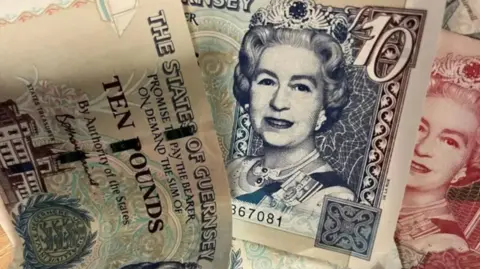Why is inflation in Guernsey higher than the UK?
 BBC
BBCThe inflation rate in Guernsey has slowed to 4.2% but remains higher than both the UK and Jersey, according to the latest figures.
The UK's inflation rate fell to 2.6% in March, and in April Jersey saw a decrease to 2.3%.
Richard Hemans, from the Institute of Directors, said housing costs were one of the main reasons Jersey had fallen behind its counterparts.
Guernsey figures showed housing contributed to 1.4% of the annual change in the inflation rate, with increases in the costs of mortgages, rents and house insurance.
'Build more homes'
Mr Hemans said Guernsey remained "stubbornly ahead" of the other jurisdictions.
"Undoubtedly the reason is housing costs," he said.
"Jersey over the last year has actually started to experience some deflation in housing costs, down nearly 1%.
"Whereas our housing costs increased by 7.8% year on year."
Mr Hemans said housing costs had contributed to over one third of the inflation figure, despite the increase slowing.
"We simply need to build more homes," he said.
"The population has been growing very fast recently so when you have an increase in the population but not a corresponding increase in the number of houses available for people to live in, house prices are going to inevitably rise."
Mr Hemans added higher inflation, "especially in relation to competitors", was "never a good thing".
He said: "It makes it harder for businesses to make profits, clearly it impacts the fiscal deficit we're seeing at the moment, costs rise faster potentially than income.
"It's definitely something we need to get a grip of and although we can't control interest rates in Guernsey, there are things we can do to moderate the rate of inflation we're experiencing locally."
The chartered director said the island could get "back into balance" with a combination of increasing taxes and reducing public spending.
"We need to promote competition in the islands, make people as productive as we possibly can, there are things we can do," he said.
'Balance social impact'
A request to increase the minimum wage in Guernsey to £12.60 an hour for adults was approved earlier this week.
The 5% rise will come into action on 1 October 2025.
Mr Hemans said while there was an important social angle to increasing minimum wage, it doesn't help inflation.
"I guess you've got to balance the social impact of what people are earning with the economic impact, businesses will have to pass those costs onto customers where they can.
"Alternatively they may find more efficient ways of working or even absorb those increases and costs into profit."
"We must also remember that over the last few years inflation has actually been lower than Jersey so it's not all doom and gloom," he added.
"It's just over the last six to nine months inflation has started to rise above that in Jersey."
Follow BBC Guernsey on X and Facebook. Send your story ideas to [email protected].
